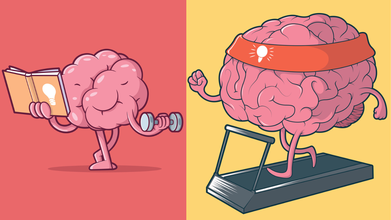- Health Conditions A-Z
- Health & Wellness
- Nutrition
- Fitness
- Health News
- Ayurveda
- Videos
- Medicine A-Z
- Parenting
Alcohol-Free But Not Risk-Free: How ‘Safe’ Non-Alcoholic Drinks Could Be Slowly Damaging Your Liver

Image Credit: Freepik
Timothy had always been health-conscious. After years of social drinking, she decided to quit alcohol for good. But giving up the ritual of sipping on a drink at social gatherings felt impossible. That's when alcohol-free beer and wine seemed like the perfect alternative—offering the taste and experience without the intoxication. However, what Sarah didn't realize was that these supposedly "harmless" drinks might still be affecting her liver in ways she hadn't anticipated.
With a global shift toward healthier choices, the rise of alcohol-free beverages has been fuelled. Do these drinks, however, live up to their promise of being risk-free? New research shows that while they may eliminate the dangers of intoxication, they still pose metabolic and liver-related risks, which calls for moderation in the long run.
What Happens in your Body within 10 Minutes of Drinking Alcohol-Free Beverages?
The first time you take a sip of an alcohol-free beverage, your body responds almost instantly. Anshul Singh, Lead Clinical Nutritionist and Dietetics Department says, "In as little as 10 minutes, your taste buds have picked up on the flavors, and your brain might even get a placebo effect, giving you the sensation that you're about to be drunk. Some alcohol-free drinks have up to 0.5% ABV, which goes into the bloodstream in minute quantities but will probably not affect you in any significant way."
By the 30-minute mark, your body has metabolized the sugars, artificial sweeteners, or additives in the drink. "Some people may experience a mild insulin spike, which can cause temporary energy boosts. Some non-alcoholic drinks also contain fermentation byproducts or botanical extracts that mimic the sedative effects of alcohol, causing slight drowsiness or relaxation," adds Anshul.
After 60 minutes, most of the drink has been metabolized. Although there is no risk of intoxication, repeated consumption can subtly affect metabolism, gut health, and even trigger cravings for alcohol among those in recovery. Those sensitive to sugar, caffeine, or preservatives might experience even more pronounced effects over time.
How Alcohol-Free Drinks Affect Your Gut and Liver Connection
Your liver and gut health are connected, forming what is called the gut-liver axis. Anshul emphasises, "Even though drinks without alcohol seem harmless, they usually contain sugars, artificial sweeteners, and fermentation byproducts that can disturb this delicate balance."
- High sugar content may lead to insulin resistance, inflammation, and fat accumulation in the liver.
- Artificial sweeteners may change the gut microbiota, causing metabolic imbalances.
- Preservatives and artificial flavors can also enhance gut permeability, thus potentially leading to leaky gut syndrome.
Long-term consumption of these drinks may gradually affect digestion, liver detoxification, and overall metabolic health, making moderation necessary.
Do Alcohol-Free Drinks Still Trigger Liver Enzymes?
Even though these nonalcoholic beverages contain virtually insignificant alcohol, the liver processes them as well. "These small concentrations of alcohol-which may go as high as 0.5% ABV-trigger the liver's detoxification pathways but only at much weaker intensities compared to ordinary alcoholic drinks. But the added sugars, artificial sweeteners, and preservatives in the products could pose significant pressure on liver functions over the long term," explains Anshul.
High sugar intake causes insulin resistance, which can lead to the buildup of fat in the liver and increase the risk of developing NAFLD. Some fermentation byproducts in these beverages also trigger oxidative stress, which puts extra pressure on the liver. Though occasional consumption will not pose a significant threat, regular consumption might lead to chronic liver stress and metabolic imbalance.
Do Non-Alcoholic Beverages Affect Liver Detoxification?
Although trace amounts of alcohol exist in alcohol-free beer and wine, the body will still have to metabolize them. The body employs the same enzymatic pathways used for alcoholic beverages but at a much lower intensity. However, the added sugars, preservatives, and fermentation byproducts present their own set of challenges:
- Mild inflammation to the liver due to the additives and byproducts within the drinks.
- Insulin resistance resulting from excessive sugar intake, causing fat accumulation in the liver.
- Detoxification pathways are overburdened, and impairment of liver function occurs gradually.
Alcohol-free drinks do not cause the liver to become overwhelmed as traditional alcohol does, although it does have a lower, but still important, risk for someone who is drinking too much. For someone with a problem of liver disease or metabolic syndrome, limiting alcohol-free drinks is also important.
Should You Drink Alcohol-Free Beverages?
Alcoholic beverages have always been a dangerous drink, but the safer option for those who want to avoid intoxication. However, it is not totally risk-free. Its impact on metabolism, gut health, and liver function cannot be ignored. Although they are not harmful at first, their consumption over a long period leads to insulin resistance, liver stress, and imbalance in the gut.
For the consumers who love these drinks, moderation is the way forward. The expert shares, "The choice of brands with the least additives, lower sugar, and natural ingredients will reduce risks. In addition, supplementing with a diet that is rich in antioxidants, fiber, and hydration can complement the liver in general."
For most, thought that adopting alcohol-free beverages was a healthier decision. On discovering their side effects on liver health, though, she learned to limit its intake and settle for alternatives that included infused sparkling water, herbal teas, or even kombucha with controlled sugar levels.
The bottom line? Alcohol-free doesn't mean consequence-free. The best way to achieve long-term health is by paying attention to what goes into the body and yet still enjoy social rituals of preference.
Anshul Singh is the Team Lead with the Clinical Nutrition and Dietetics Department at Artemis Hospitals in India.
Can You Safely Stop Blood Pressure Medication After Your Numbers Improve?

Credits: Canva
High blood pressure is a serious health issue, but it usually causes no obvious symptoms until significant harm has already occurred. This makes it difficult for many patients to stay consistent with their medication. When you do not feel any immediate change after missing a pill, it becomes easier to forget doses or stop altogether.
Many people assume it is “not a big deal” to skip a dose now and then, or even to quit the medicine completely. In reality, blood pressure medication is often meant to be taken long term, sometimes for life, though certain medicines may need to be stopped or switched during pregnancy. In some cases, people may be able to gradually reduce or fully stop their medication if major lifestyle changes lead to a clear and lasting drop in blood pressure.
How Does Blood Pressure Medicines Work?
Blood pressure medicines, also called antihypertensives, lower high blood pressure in different ways. They may relax blood vessels, lessen how hard the heart has to work, or reduce the amount of fluid in the body. These effects help lower the risk of serious problems such as heart attacks and strokes.
According to Medline Plus, these drugs work by blocking hormones that tighten blood vessels, helping the kidneys flush out excess salt and water, slowing the heart rate, or stopping calcium from tightening the arteries, which allows blood to move more freely.
What Happens When You Stop Taking Blood Pressure Medications?
If you miss a dose, it is usually best to take it as soon as you remember, unless it is close to the time for your next dose. Skipping one dose is generally less risky than taking too much. To avoid forgetting, it helps to take your medication at the same time every day and link it to a daily habit. For example, morning pills can be taken with breakfast, while evening pills can be kept near your toothbrush.
Along with choosing a regular time, your doctor may also suggest a specific time of day. One large study found that taking blood pressure medicine at bedtime significantly lowered the risk of heart attack.
Is It Safe To Stop Your Blood Pressure Medicine If Your Numbers Improve
According to Health Central, it is understandable to think about stopping your medication once your blood pressure readings improve and you feel well. However, you should never stop taking these medicines, especially all at once, without speaking to your doctor first.
Stopping blood pressure medication suddenly can lead to withdrawal effects that vary in severity, including:
- Blurry vision
- Chest pain
- Fatigue
- Headaches
- Irregular heartbeat
- Lightheadedness
- Rebound hypertension
- Rebound water retention
- Shortness of breath
When high blood pressure is no longer treated, your readings may return to previous levels or rise very quickly and dangerously, leading to what doctors call a hypertensive crisis. This is defined as a blood pressure reading above 180/120. It is a medical emergency and raises the risk of:
- Blindness
- Heart attack
- Heart failure
- Kidney damage
- Stroke
The harm caused by a hypertensive crisis is not always reversible and can sometimes be life-threatening.
When Can You Stop Taking Blood Pressure Medicine?
If you and your doctor decide that trying life without blood pressure medication is possible and something you want to explore, the safest approach is tapering. This means slowly reducing the dose over time rather than stopping suddenly.
Before doing this, you will need to regularly monitor your blood pressure at home while still on medication and share those readings with your doctor. If your numbers stay consistently at the lower end of the normal range while on treatment, such as around 115/80 mmHg or lower, your doctor may consider gradually reducing your dependence on medication.
Disclaimer: This information is meant for general awareness only and should not be treated as medical advice. Blood pressure medications affect each person differently, and stopping or changing your dose without proper medical guidance can be dangerous. Always speak to a qualified doctor or healthcare provider before starting, adjusting, or discontinuing any medication.
On Diltiazem For Blood Pressure Or Heart Issues? Look Out For These 3 Symptoms

Credits: Canva
People who are prescribed a widely used medication are being advised to contact a doctor if they notice certain symptoms. As per Mirror, health officials say these “serious” side effects should not be delayed or ignored and may need medical review sooner rather than later. Diltiazem is a drug commonly given to manage high blood pressure. It is also sold under brand names such as Adizem, Angitil, Tildiem, Viazem, and Zemtard.
Doctors prescribe it to people with high blood pressure to lower the risk of coronary heart disease, heart attacks, and strokes. The medicine helps by reducing blood pressure and allowing the heart to pump blood more easily through the body. However, new warnings linked to the drug have now been highlighted.
What Is Diltiazem?
Diltiazem belongs to a group of medicines called calcium channel blockers. It is used to treat high blood pressure, long-term stable angina, which causes chest pain, and certain types of irregular heartbeats. The drug works by relaxing blood vessels and easing the strain on the heart. According to Medline Plus, common side effects may include dizziness, headaches, swelling, and a slower heart rate. It is mainly prescribed for hypertension, angina, and heart rhythm conditions such as atrial fibrillation. In some cases, it is also used in cream form to help treat anal fissures.
The NHS website also states that diltiazem may be used to:
- Prevent chest pain linked to angina
- Lower the number of attacks in people with Raynaud’s phenomenon
- Support the healing of an anal fissure
Like most medicines, diltiazem can cause side effects, although many people may not experience any. The NHS notes that there are several “common” side effects patients should be aware of.
Diltiazem Common Side Effects
These effects are seen in more than one in 100 people. The NHS explains: “They are usually mild and do not last long. There are ways to help manage them.”
They include:
- Swelling in the hands, ankles, or feet
- Headaches
- Dizziness or feeling light-headed
- Feeling tired, weak, or generally unwell
- Feeling hot, flushed, or noticing redness of the skin
- Itching or a burning feeling on the skin where the cream or ointment is applied
- Stomach discomfort
- Indigestion
- Constipation
The NHS adds: “Talk to a doctor or pharmacist if coping advice does not help, or if a side effect continues or becomes troublesome.”
Diltiazem Serious Side Effects
In rare cases, diltiazem may lead to “serious side effects.” These are reported in fewer than one in 10,000 people.
According to the NHS, you should “stop taking diltiazem and contact a doctor or call 111 immediately” if:
- You experience severe stomach pain
- The whites of your eyes or your skin turn yellow, which may be harder to notice on brown or black skin and could point to liver problems
- You become aware of your heartbeat or notice palpitations
You should also call 999 or go straight to A&E if you have chest pain that does not ease after a few minutes, or if chest pain is new or worse than usual when you already have angina. This may indicate a heart attack and requires urgent medical attention.
These 6 Habits Will Slow Your Aging, According To A Harvard Brain Expert

Credits: iStock
Before "brain health" became a buzzword, Rudolph E Tanzi started to write the science behind it. Tanzi is a neurology professor at the Harvard, and co-director of the Henry and Allison McCance Center for Brain Health at Massachusetts General Hospital is known for discovering three key Alzheimer's genes. In his 46-year career, he wrote hundreds of journal articles that helped in shaping the modern understanding of neurodegenerative illness.
In 2023, neuroscientist also teamed up with holistic health advocate Deepak Chopra to write Super Brain, a book that pushed against the idea that brain has fixed limits. The belief also sits at the heart of SHIELD, which a lifestyle framework developed by Tanzi to protect long-term brain health. It focuses on six pillars:
- Sleep
- Handling stress
- Interaction with others
- Exercise
- Learning
- Diet
Tanzi now 67, says these principles are not just theoretical, but he credits his own research and daily habits for helping him stay mentally sharp, physically active and deeply engaged in his work.
“I’m doing more work and having more fun and excitement than ever,” he says. “Your world can feel young or stagnant based entirely on the health of your brain. Most people do not realize that.”
Let us look deeper into SHIELD:
Sleep

Tanzi aims for seven to eight hours of quality sleep each night. Sleep, he explains, is not just rest. It is active maintenance for the brain.
During deep sleep, the brain clears out toxins, including amyloid proteins that are linked to Alzheimer’s disease years before symptoms appear. Each deep sleep cycle works like a rinse for the brain.
Rather than following a fixed bedtime, Tanzi plans backward from his wake-up time to ensure at least seven hours of sleep. An hour before bed, screens go off and phone scrolling stops. If sleep falls short, he recommends short power naps, even brief ones.
Handling stress
Chronic stress is one of the biggest threats to brain health. It raises cortisol levels, which Tanzi describes as toxic to the brain over time.
He believes modern life has amplified stress through constant notifications, emails and social media. His primary tool to counter this is meditation, especially practices that quiet the constant internal chatter many people experience.
Tanzi suggests closing your eyes periodically during the day and focusing on images rather than words. Let thoughts come and go without turning them into sentences. He also warns against living mentally in the past or worrying excessively about the future instead of staying present.
Reducing this internal noise, he says, boosts creativity, intuition and mental clarity.
Interaction with friends
Social connection matters more than many people realize. Loneliness has been linked to a higher risk of cognitive decline.
The key, Tanzi says, is interacting with people you genuinely enjoy. Stressful social interactions do not count. Even regular texting or phone calls can help.
Because many of his friends live far away, Tanzi stays connected through small, intentional check-ins with different friend groups each day. Used this way, social media can actually support brain health instead of draining it.
Read: Neurologist Shares 10 Eating Habits For A Longer, Healthier Life
Exercise

Regular movement improves blood flow to the brain and helps form new nerve cells, particularly in areas affected early by Alzheimer’s disease. Exercise also releases hormones that help break down harmful amyloid buildup.
Tanzi cycles on a stationary bike for 30 minutes every other day and walks on alternate days. He points to research showing that even modest increases in daily steps can meaningfully reduce dementia risk.
Learning new things
Learning builds new synapses, the connections that store memories and support thinking. When these connections weaken, cognition suffers.
As people age, Tanzi says they often become less adventurous and rely on the same mental patterns. That stagnation harms the brain.
To counter this, he constantly learns new music on the keyboard, writes his own compositions, reads widely and watches documentaries. New experiences keep the brain flexible and resilient.
Diet

Diet plays a central role in brain health, largely through the gut microbiome. When gut bacteria are balanced, they produce compounds that reduce inflammation and help clear amyloid from the brain.
Tanzi follows a Mediterranean-style diet rich in fruits, vegetables, olive oil, nuts and seeds. He is mostly vegan but not rigid. His snacks tend to be crunchy whole foods that gut bacteria thrive on.
He is also increasingly focused on environmental factors that affect the brain. His upcoming book will explore what he calls the “killer P’s,” including plastics, pollution, periodontal bacteria and processed foods, and how they quietly shape long-term brain health.
© 2024 Bennett, Coleman & Company Limited

